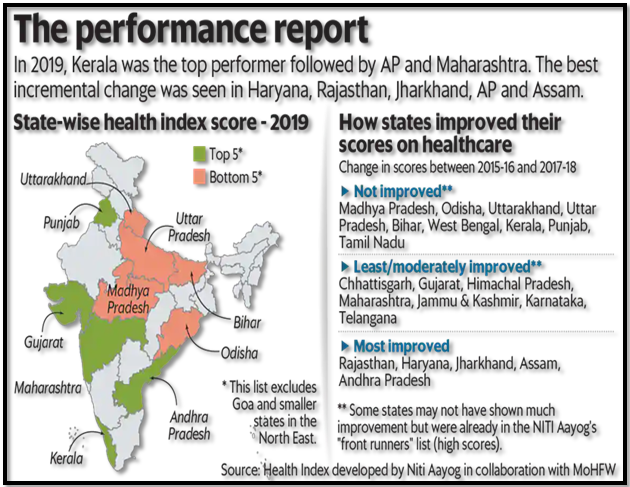INDIA AND THE MANAGED CARE PROMISE
Syllabus:
GS 2:
Welfare Schemes for Vulnerable Sections of the population by the Centre and States.
Issues Relating to Development and Management of Social Sector/Services relating to Health.
Why in the News?
A prominent health-care chain in South India has announced the introduction of a comprehensive health insurance model, integrating insurance and health-care services. This development highlights the potential for managed care organizations (MCOs) in India, offering a pathway to improved health coverage and cost management.
Source: HT
The Rise of Health Insurance in India
- Policy Integration: Health insurance is becoming a core component of India’s approach to universal health coverage (UHC).
- Digital Revolution: Technological advancements are driving reforms similar to those seen in the United States, but adapted to avoid excessive health expenditure.
- Comprehensive Health Insurance: A prominent South Indian health-care chain has recently ventured into offering comprehensive health insurance, merging insurance and health-care provision.
- Managed Care Organizations (MCOs): This initiative represents India’s version of MCOs, which integrate insurance and health services.
- Potential for UHC: It’s important to assess whether MCOs can contribute significantly to India’s goal of achieving UHC.
Historical Context of MCOs
- U.S. Precedents: MCOs have their roots in early 20th-century U.S. prepaid health-care practices.
- 1970s Evolution: The concept gained traction in the 1970s in response to high health-care costs and economic downturns.
- Insurance and Provision Fusion:
MCOs combined insurance and care provision to control costs and emphasize prevention.
- Cost Control: This model aimed to reduce high premiums and make health insurance more attractive by focusing on cost containment.
- Lack of Robust Evidence: Despite mixed evidence on improving health outcomes, MCOs have effectively reduced hospitalizations and associated costs.
Indian Health Insurance Landscape
- Indemnity Insurance Focus: Since the 1980s, Indian health insurance has primarily covered hospitalization costs, overlooking the vast market for outpatient care.
- Innovation Deficit: Health insurance in India has seen limited innovation and high operational costs, often overshadowed by life and general insurance.
- Market Characteristics: The Indian health insurance market is urban-centric and caters predominantly to the affluent.
- Informal Practices: Outpatient care in India is characterized by informal practices and a lack of standardized clinical protocols.
- Systemic Challenges: The absence of incentives for cost control has hindered the evolution of a managed care approach.
Managed Care in Developing Nations
- Characteristics of MCOs: Studies have shown that MCOs in developing nations are typically urban-focused and attract higher-income groups.
- Financial and Managerial Clout: Successful MCOs require significant financial resources, managerial skills, and defined beneficiary bases.
- Indian Contrasts: Unlike the U.S., India’s health insurance has not naturally evolved to encourage consumer-driven cost control.
- Urban Affluence Focus: Indian insurance has targeted the urban well-off, with limited impact on broader health care accessibility.
- Potential for Public-Private Partnerships: Large health-care brands with loyal urban patient bases could drive initial MCO initiatives, but broad-based UHC contributions are unlikely without public support.
| Universal Health Care Initiatives in India
1. Ayushman Bharat Pradhan Mantri Jan Arogya Yojana (PM-JAY):
2. Ayushman Bharat Health and Wellness Centres (HWCs):
3. Rashtriya Swasthya Bima Yojana (RSBY):
4. National Health Mission (NHM):
5. Janani Suraksha Yojana (JSY):
6. Mission Indradhanush:
7. Pradhan Mantri Swasthya Suraksha Yojana (PMSSY):
8. Pradhan Mantri Matru Vandana Yojana (PMMVY):
|
Opportunities for Managed Care in India
- Outpatient Care Costs: Comprehensive outpatient care coverage offers significant potential for cost reduction through early intervention.
- Patient Journey Control: Current insurers have little influence over patient care until hospitalization, highlighting the need for integrated care models.
- NITI Aayog Endorsement: A 2021 NITI Aayog report supports outpatient care insurance schemes that could yield substantial savings through better care integration.
- Preventive Care Focus: Managed care could streamline management protocols, consolidate practices, and embed a preventive care approach in the private sector.
- Public Incentives: Incentives similar to those under the Ayushman Bharat Mission could promote MCOs, initially targeting PMJAY beneficiaries and private clients on a pilot basis.
The Complex Path to UHC
- Incremental Approach: UHC requires multifaceted solutions, and MCOs could be part of the broader strategy.
- Pilot Programs: Initial public support and pilot programs could help MCOs gain traction and demonstrate their effectiveness.
- Awareness and Expansion: Public initiatives could increase awareness and expand the reach of MCOs, gradually growing the self-paying client base.
- Comprehensive Solutions: UHC is complex, and while MCOs aren’t a panacea, they offer valuable contributions to a more integrated health-care system.
- Balanced Strategy: Managed care should be part of a balanced approach, addressing both public and private health-care needs to achieve sustainable UHC.
Way Forward for Managed Care in India
- Public-Private Partnerships: Foster collaboration between government initiatives and private health-care providers to build robust Managed Care Organizations (MCOs).
- Regulatory Framework: Develop a comprehensive regulatory framework to ensure quality, transparency, and accountability in MCO operations.
- Pilot Programs: Launch pilot projects in urban and semi-urban areas to test the feasibility and effectiveness of MCOs, focusing on integrating outpatient and preventive care.
- Incentivize Participation: Provide financial and policy incentives to health-care providers and insurers to adopt the managed care model.
- Technology Integration: Leverage digital health technologies to streamline patient management, reduce costs, and enhance care coordination within MCOs.
- Training and Capacity Building: Invest in training programs for health-care professionals and administrators to equip them with the skills needed for managing MCOs effectively.
Conclusion
Managed care organizations (MCOs) offer a promising solution to India’s health-care challenges by integrating insurance with care provision, focusing on prevention, and reducing costs. With careful implementation and public-private collaboration, MCOs can significantly contribute to achieving universal health coverage in India.
Source:The Hindu
Mains Practice Question:
Discuss the potential benefits and challenges of implementing managed care organizations (MCOs) in India’s health-care system. How can MCOs contribute to achieving universal health coverage (UHC)?
Associated Article:
https://universalinstitutions.com/ayushman-bharat-centres-renamed-as-ayushman-arogya-mandir/




